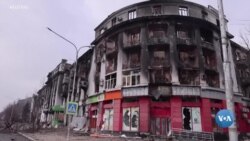ໃນຂະນະທີ່ສົງຄາມໃນຢູເຄຣນ ກຳລັງເຂົ້າສູ່ປີທີສີ່, ຊາວຢູເຄຣນ 6 ລ້ານ 8 ແສນຄົນ ຍັງຄົງເປັນອົບພະຍົບຢູ່. ບັນດານັກຄົ້ນຄວ້າກ່າວວ່າ ຕ່ຳກວ່າເຄິ່ງນຶ່ງວາງແຜນຈະກັບຄືນປະເທດ ເມື່ອສົງຄາມສິ້ນສຸດລົງ. ລີເຊຍ ບາກາເລັຕສ໌ ລາຍງານຈາກກີຢິບ ກ່ຽວກັບສິ່ງທີ່ສາາມາດເຮັດໄດ້ ເພື່ອຊັກຊວນ ພວກເຂົາໃຫ້ກັບຄືນບ້ານເກີດເມືອງນອນຂອງເຂົາເຈົ້າຫຼາຍຂຶ້ນ.
ນີ້ແມ່ນເມືອງບາກມຸຕ ຢູ່ພາກຕາເວັນອອກຂອງຢູເຄຣນ ທີ່ເຄີຍເບິ່ງເປັນຄືແນວນີ້ ກ່ອນທີ່ເມືອງນີ້ ຈະຖືກຄຸ້ມຄອງໂດຍກອງທັບຣັດເຊຍ ໃນລະດູບານໃໝ່ປີ 2023.
ທ່ານນາງ ກາລີນາ ກຣາໂນ ໄດ້ຫລົບໜີຈາກເມືອງນີ້ ກັບຄອບຄົວຂອງລາວ ໃນຊ່ວງເລີ້ມຕົ້ນການບຸກລຸກເຕັມຮູບແບບຂອງຣັດເຊຍ ເມື່ອນຶ່ງປີກ່ອນ.
ດຽວນີ້ ທ່ານນາງກ່າວວ່າ ລາວບໍ່ມີບ່ອນໃດທີ່ຈະກັບຄືນໄປ.
ທ່ານນາງ ກາລີນາ ກຣາໂນ ອົບພະຍົບຊາວຢູເຄຣນ ກ່າວຜ່ານຊູມ ໃນພາສາຢູເຄຣນ ວ່າ
“ໃນເດືອນຕຸລາ 2022 ຂ້ອຍໄດ້ເຫັນວີດີໂອທາງອອນໄລນ໌ ຈາກເມືອງນີ້ ແລ້ວຈື່ຕຶກອາພາດເມັ້ນຂອງຂ້ອຍໄດ້. ມຸມຫ້ອງນອນຂອງລູກສາວຂ້ອຍ ແມ່ນຍັງຢູ່ທີ່ນັ້ນ. ໂຕະໜ່ວຍນຶ່ງຍັງຕັ້ງຢູ່ຄືເກົ່າ ຈໍໂທລະພາບກໍຕັ້ງຢູ່ເທິງໂຕະ ແຕ່ທຸກສິ່ງທຸກຢ່າງອື່ນໆ ໄດ້ຖືກທຳລາຍ.”
ທ່ານນາງ ກຣາໂນ ໄດ້ດຳລົງຊີວິດຢູ່ໃນໂປແລນ ກັບຄອບຄົວຂອງລາວ ເປັນປີທີສາມແລ້ວ. ລາວກ່າວວ່າ ເປັນໄປໄດ້ສູງທີ່ລາວຈະບໍ່ກັບຄືນໄປຢູເຄຣນ.
ທ່ານນາງ ກາລີນາ ກຣາໂນ ອົບພະຍົບຊາວຢູເຄຣນ ກ່າວໃນພາສາຢູເຄຣນ ຜ່ານຊູມ ວ່າ “ຂ້ອຍໄດ້ປັບປຸງພາສາໂປແລນ - ໄດ້ສອບຜ່ານລັດຢູ່ລະດັບ ບີນຶ່ງ; ໄດ້ເຂົ້າຮຽນຫລັກສູດບັນຊີຕ່າງໆຂອງໂປແລນ. ລູກສາວຂອງຂ້ອຍ ກໍໄດ້ເຂົ້າຮຽນມະຫາວິທະຍາໄລ. ເພາະສະນັ້ນ ເປັນໄດ້ສູງທີ່ສຸດ ພວກເຮົາຈະຢູ່ທີ່ນີ້.”
ຊາວຢູເຄຣນ ໂດຍສ່ວນໃຫຍ່ ທີ່ໄດ້ຫລົບໜີສົງຄາມ ກໍມີທັດສະນະແບບດຽວກັນກັບທ່ານນາງ ກຣາໂນ, ກ່າວໂດຍ ທ່ານ ຮລິບ ວິສິນສກີ ຜູ້ອຳນວຍການບໍລິຫານ ຂອງສູນກາງເພື່ອຍຸດທະສາດດ້ານເສດຖະກິດ ເຊິ່ງເປັນອົງການຄົ້ນຄວ້າ ທີ່ບໍ່ຂຶ້ນກັບລັດຖະບານ ໃນນະຄອນຫຼວງ ກີຢິບ.
ທ່ານ ວິສິນສກີ ກ່າວໃນພາສາຢູ່ເຄຣນ ວ່າ “ພວກເຮົາໄດ້ເຮັດການສຳຫຼວດ ເມື່ອທ້າຍປີ 2022 ແລະໄດ້ພົບວ່າ ຫຼາຍກວ່າ 50 ເປີເຊັນຂອງຊາວຢູເຄຣນອົບພະຍົບ ມີເຈດຕະນາຢ່າງແຈ່ມແຈ້ງທີ່ຈະກັບຄືນປະເທດ. ດຽວນີ້ ຈຳນວນເປີເຊັນໄດ້ຫລຸດລົງຮອດປະມານ 20 ເປີເຊັນ.”
ການຂາດຄວາມປອດໄພ ເປັນປັດໄຈຫຼັກນຶ່ງ ທ່ານ ວິສິນສກີ ກ່າວ.
ທ່ານນາງ ມາກາຣີຕາ ຊີຕນິກ ເປັນຄູ່ຮ່ວມກໍ່ຕັ້ງກຸ່ມເຄືຶ່ອນໄຫວ ທີ່ເອີ້ນວ່າ “ໂຮລກາ (Holka)”
ທ່ານນາງ ກ່າວວ່າ ອຸປະສັກອື່ນໆລວມມີ ການຂາດແຄນວຽກ ແລະທີ່ຢູ່ອາໄສ.
ທ່ານນາງ ຊີຕນິກ ກ່າວໃນພາສາຢູເຄຣນ ຜ່ານສະໄກປ໌ ວ່າ “ບໍ່ວ່າຈະເປັນພື້ນຖານໂຄງລ່າງ ໂຮງຮຽນ ຫຼື ໂອກາດຕ່າງໆສຳລັບເດັກໆ -ສິ່ງທັງຫຼາຍເຫຼົ່ານີ້ ເປັນປັດໄຈອັນສຳຄັນ ທີ່ຈະສົ່ງຜົນຕໍ່ການຕັດສິນໃຈໃຫ້ກັບຄືນ ຫຼື ຈະຢູ່ຕ່າງປະເທດ.”
ທ່ານນາງ ຊີຕນິກ ໄດ້ອາໄສ ແລະເຮັດວຽກຢູ່ໃນໂປແລນ ເປັນເວລາເຈັດປີ. ແຕ່ເມື່ອສົງຄາມໄດ້ເລີ້ມຂຶ້ນ ລາວໄດ້ຕັດສິນໃຈກັບຄືນໄປຢູເຄຣນ.
ທ່ານນາງ ຊີຕນິກ ໄດ້ອະທິບາຍວ່າ “ໃນຖານະເປັນຄົນຜູ້ນຶ່ງທີ່ມີປະສົບການໃນດ້ານການຍົກຍ້າຍຖິ່ນຖານ, ຂ້ອຍເຂົ້າໃຈເຖິງຄວາມຢ້ານກວ່າ ແລະຄວາມຍາກລຳບາກຂອງພວກຄົນເຫຼົ່ານັ້ນ.”
ອີງຕາມສູນເພື່ອຍຸດທະສາດດ້ານເສດຖະກິດ 80 ເປີເຊັນຂອງຊາວຢູເຄຣນອົບພະຍົບ ເຮັດວຽກງານຕ່າງໆທີ່ຕ້ອງການຄຸນສົມບັດຕ່ຳກວ່າທີ່ພວກເຂົາມີຢູ່.
ນັກຊ່ຽວຊານດ້ານນະໂຍບາຍການຍົກຍ້າຍຖິ່ນຖານ ທ່ານແອນດຣີ ໄກດຸຕສກີ ເຊື່ອວ່າ ຫຼາຍຄົນໂດຍທຳມະຊາດແລ້ວ ຈະຢາກຟື້ນຟູສະຖານະຂອງພວກເຂົາເຈົ້າ ແລະເລືອກທີ່ຈະກັບຄືນໄປອີກ ເມື່ອໃດທີ່ມີສັນຕິພາບ ແລະສະພາບການເອື້ອອຳນວຍໃຫ້ - ບາງສິ່ງບາງຢ່າງທີ່ລັດຖະບານຂອງຢູເຄຣນ ຈະຕ້ອງຫາວິທີທາງ.
ທ່ານ ໄກດຸຕສກີ ກ່າວໃນພາສາຢູເຄຣນ ວ່າ “ໃຫ້ລັດສ້າງເງື່ອນໄຂຕ່າງໆສຳລັບການພັດທະນາທຸລະກິດທີ່ນີ້. ຜູ້ຈ້າງງານ ຈະຕ້ອງວ່າຈ້າງຊາວຢູເຄຣນອົບພະຍົບ ຜູ້ທີ່ກັບຄືນມາ, ໂດຍສະໜອງໂອກາດທີ່ຈະເຮັດວຽກໃຫ້ແກ່ເຂົາຢູ່ທີ່ນີ້ ແລະຮັບເງິນຄ່າເຊົ່າທີ່ຢູ່ອາໄສ.”
ມັນຍັງບໍ່ມີຄວາມກະຈ່າງແຈ້ງທີ່ວ່າ ພວກຄົນເຫຼົ່ານັ້ນ ໄດ້ຖືກບັງຄັບໃຫ້ຢູ່ໃນຢູເຄຣນ ຫຼືບໍ່ ໃນລະຫວ່າງສົງຄາມນັ້ນ ຍັງຈະຢູ່ຕໍ່ໄປຫຼັງຈາກບັນຫາຂັດແຍ້ງຍຸຕິ.
ທ່ານ ໄກດຸຕສກີ ກ່າວອີກວ່າ “ອີງຕາມການສຳຫຼວດ, ຫຼັງຈາກເຂດຊາຍແດນເປີດຄືນໃໝ່, ຊາວຢູເຄຣນ ທຸກຫ້າຄົນໃດອາດອອກໄປ. ສະນັ້ນ ມັນຄຸ້ມຄ່າທີ່ຈະພິຈາລະນາເຖິງເງື່ອນໄຂຕ່າງໆທີ່ຊາວຢູເຄຣນຜູ້ປະສົບກັບການບຸກລຸກຢ່າງເຕັບຮູບແບບ ຕໍ່ດິນແດນຂອງຢູເຄຣນ, ຈະອາໄສຢູ່.”
ອົງການສະຫະປະຊາຊາດ ກ່າວວ່າ ມີຊາວຢູເຄຣນອົບພະຍົບ ປະານ 7 ລ້ານຄົນໃນທົ່ວໂລກ - ເທົ່າກັບເກືອບນຶ່ງສ່ວນຫົກຂອງປະຊາກອນໃນປະເທດ ກ່ອນເກີດສົງຄາມ.
ອ່ານລາຍງານໃນພາສາອັງກິດ
As Ukraine’s war enters its fourth year, 6.8 million Ukrainians remain refugees. Researchers say fewer than half plan to return when the war ends. From Kyiv, Lesia Bakalets reports on what can be done to encourage more of them to return to their homeland.
https://data.unhcr.org/en/documents/details/112726
https://ces.org.ua/en/refugees-fourth-wave/
This is what the eastern Ukrainian city of Bakhmut looked like before it was occupied by the Russian army in spring 2023.
Galyna Grahno fled the city with her family at the start of Russia’s full-scale invasion the year before.
Now, she says she has nowhere to return to.
((Galyna Grahno, Ukrainian Refugee – FEMALE, UKR))
“In October 2022, I saw a video online from the city and recognized my apartment. The corner of my daughter's bedroom was still there. The table was even standing, a monitor on the table, but everything else was destroyed.”
Grahno has been living in Poland with her family for a third year. She says she is unlikely to come back to Ukraine.
((Galyna Grahno, Ukrainian Refugee – FEMALE, UKR))
“I improved my Polish – passed the state exam at level B1; took Polish accounting courses. My daughter entered a university. Therefore, most likely, we will stay here”.
Most Ukrainians who fled the war share Grahno's view, says Hlib Vyshlinsky, executive director of the Centre for Economic Strategy, a non-governmental research organization in Kyiv.
https://ces.org.ua/en/experts/hlib-vyshlinsky-en/
((Hlib Vyshlinsky, Centre for Economic Strategy – MALE, UKR))
"We did a survey at the end of 2022 and [found] more than 50% of (Ukrainian refugees) had a clear intention to return. Now, this has dropped to around 20%.”
Lack of security is one of the main factors, Vyshlinsky says.
Margaryta Sytnyk is a co-founder of the advocacy group “Holka.”
She says other obstacles include the lack of work and housing.
https://holka.org.ua/en/team/margaryta-sytnyk/
((Margaryta Sytnyk, Holka Co-Founder – FEMALE, UKR))
“Whether there will be infrastructure, a school or prospects for children – these are huge factors that will influence the decisions to return or stay abroad.”
Sytnyk lived and worked in Poland for seven years. But when the war broke out, she decided to return to Ukraine.
((Margaryta Sytnyk, Holka Co-Founder – FEMALE, UKR))
“As a person with migrant experience, I understand the fears and pains of those people.”
According to the Centre for Economic Strategy, 80% of Ukrainian refugees work in jobs that require lower qualifications than they have.
Migration policy expert Andrii Gaidutski believes many will naturally want to restore their status and choose to return once there’s peace and conditions are favorable – something Ukraine’s government will need to figure out.
https://www.facebook.com/gaidutskyi
((Andrii Gaidutskyi, Migration Policy Expert – MALE, UKR))
“Let the state create conditions for business development here. An employer will hire a Ukrainian refugee who has returned, providing him an opportunity to work here and earn rent for housing.”
It’s also unclear whether those who have been forced to stay in Ukraine during the war will remain after the conflict ends.
https://holka.org.ua/en/team/margaryta-sytnyk/
((Margaryta Sytnyk, Holka Co-Founder – FEMALE, UKR))
“According to the survey, after the borders are opened, every fifth Ukrainian may leave. So, it is worth considering the conditions in which Ukrainians who are experiencing a full-scale invasion, on the territory of Ukraine, will live.”
The United Nations says there are about 7 million Ukrainian refugees globally — nearly one-sixth of the country’s pre-war population.






ຟໍຣັມສະແດງຄວາມຄິດເຫັນ